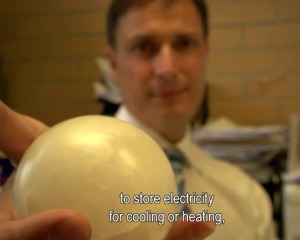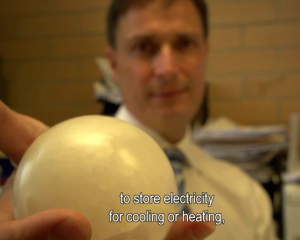
Researchers from the University of South Australia have devised a low cost storage solution that uses salt to store electricity. Their brilliant solution has been recognised by Australia’s top science body which has awarded them with accolades and science awards. They have also also won the ANSTO Eureka Prize for Innovative Use of Technology.
Glaciem has been quick to capitalise on their research work and has not only patented their findings but has also commercialised it. The “phase change” storage technology stores surplus electricity harvested, for example, from solar panels into frozen compacted salt coils which are carefully and purposefully laid in a storage tank built for this very purpose. The storage tank is unlike the old style electric hot water heaters still prevalent in many Australian homes.
As and when the electricity is to be drawn, such as the sun goes down or when the town’s electricity supply is not dysfunctional, the compact coils can be persuaded to released the energy stored in them by melting the salt.
Although the idea of storing energy in salt may not be totally brand new, as molten salt batteries are used in large numbers in solar thermal plants, including the world’s biggest installation located in the Crescent Dunes facility in Nevada, U.S, but what these researchers have done is use salt as a phase changing material for much small scales than that present in the 1100MW installation in Nevada. Additionally, it is also ten times cheaper than their most favourite and closest competitor, sodium iron batteries.
Interestingly, sodium-ion batteries are all set to compete if not replace lithium-ion battery technology in the near future.
According to Frank Bruno, an Associate Professor at University of South Australia, his team’s salt-based energy storage system is superior to existing battery technologies currently available off the shelf because it is offers not only a much more economical alternative, but also it is relatively more compact in design in relation to the amount of energy it can store, rapid discharge capabilities and the fact that it does not eventually go flat.
“The key was getting the price down, to try to develop energy storage that is effective and cheap,” said Bruno to an Adelaide Advertiser.
“This energy storage technology can be used for refrigeration, or air conditioning for homes, or solar power plants, so, yes, it is a big change,” he said.
For those who are more interested to know whether this technology will in fact work or not, a full-scale commercial version of it is operational in an Australian farm according to Bruno
The idea as per Bruno is:
“... not to store excess solar, but to store cheap electricity from the grid overnight, and then use that to power the farm’s cool rooms during the day.”
Source: http://reneweconomy.com.au/2015/molten-salt-storage-for-rooftop-solar-sa-invention-wins-eureka-prize-99882
Glaciem has been quick to capitalise on their research work and has not only patented their findings but has also commercialised it. The “phase change” storage technology stores surplus electricity harvested, for example, from solar panels into frozen compacted salt coils which are carefully and purposefully laid in a storage tank built for this very purpose. The storage tank is unlike the old style electric hot water heaters still prevalent in many Australian homes.
As and when the electricity is to be drawn, such as the sun goes down or when the town’s electricity supply is not dysfunctional, the compact coils can be persuaded to released the energy stored in them by melting the salt.
Although the idea of storing energy in salt may not be totally brand new, as molten salt batteries are used in large numbers in solar thermal plants, including the world’s biggest installation located in the Crescent Dunes facility in Nevada, U.S, but what these researchers have done is use salt as a phase changing material for much small scales than that present in the 1100MW installation in Nevada. Additionally, it is also ten times cheaper than their most favourite and closest competitor, sodium iron batteries.
Interestingly, sodium-ion batteries are all set to compete if not replace lithium-ion battery technology in the near future.
According to Frank Bruno, an Associate Professor at University of South Australia, his team’s salt-based energy storage system is superior to existing battery technologies currently available off the shelf because it is offers not only a much more economical alternative, but also it is relatively more compact in design in relation to the amount of energy it can store, rapid discharge capabilities and the fact that it does not eventually go flat.
“The key was getting the price down, to try to develop energy storage that is effective and cheap,” said Bruno to an Adelaide Advertiser.
“This energy storage technology can be used for refrigeration, or air conditioning for homes, or solar power plants, so, yes, it is a big change,” he said.
For those who are more interested to know whether this technology will in fact work or not, a full-scale commercial version of it is operational in an Australian farm according to Bruno
The idea as per Bruno is:
“... not to store excess solar, but to store cheap electricity from the grid overnight, and then use that to power the farm’s cool rooms during the day.”
Source: http://reneweconomy.com.au/2015/molten-salt-storage-for-rooftop-solar-sa-invention-wins-eureka-prize-99882





